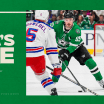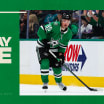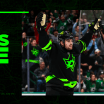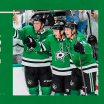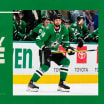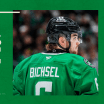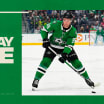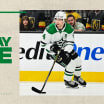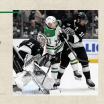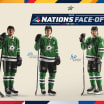It wasn't just that forwards and countrymen Ales Hemsky and Radek Faksa became close in the sense of 'friends' last season when Faksa was called up to the NHL.
"I was living at his house, too," Faksa said.
Faksa became an understudy of sorts, and followed Hemsky all the way onto the same line. Along with Antoine Roussel, they were a unit that earned more playing time by effectively filling a checking, defensive niche for head coach Lindy Ruff.
Faksa and Lindell gaining confidence at World Cup
Both players using World Cup experience as an opening audition to regular roles in Dallas
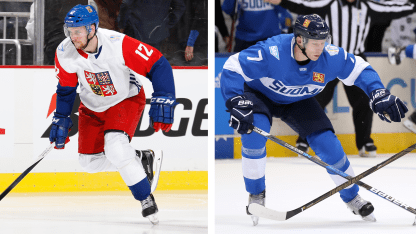
By
Evan Sporer @ev_sporer
"I wasn't expecting I would play that much, but we played good," said Faksa, who averaged 16:08 of ice time during the postseason, up nearly four minutes from his regular season average. "We had a good playoffs, and we were playing our game, and coach trusted us and gave us more ice time."
But Faksa said he knows that guarantees him nothing, as he and another young Stars skater, Esa Lindell, are attempting to parlay strong performances at the 2016 World Cup of Hockey into an inroad to the Stars 2016-17 roster.
"It's a big tournament; everyone is watching that," Faksa said. "People in Dallas will watch it, how I'm going in this level.
"Every tournament, and every practice is still important for me because I'm still the young guy. I just have one season in the NHL. Every day is important for me."
Of the two youngsters, Faksa (22) is 135 days older than Lindell, and also owns more NHL experience. Both made their NHL debuts last season, with Lindell playing in four games in January, and Faksa becoming a mainstay in Dallas' lineup in the latter portions of the regular season and through the playoffs.
"I was responsible a lot," Faksa said. "I tried to play defense first, and from the defense, we were getting the offense. Just be patient is what I learned from it."
Though they're the same age, Faksa has been in North America since 2011, when he began a career in the Ontario Hockey League. He credited part of his success in the NHL last season to spending parts of the previous three seasons in the American Hockey League.
For Lindell, 2015-16 was his true first exposure to North American hockey. He played 73 games in Cedar Park with the Texas Stars, reconfiguring his circuit board to the size of the rink, and the style and pace of play.
"It helped me a lot, especially getting to play in the AHL big minutes," he said. "I played PK, PP, and that's much better than me sitting in the stands or playing 8-12 minutes (in Dallas)."
Now both players find themselves in Toronto, representing their respective countries, and poised to use the World Cup as an opening audition to regular roles in Dallas.
"It kind of shows me where I'm going, and how I can play," Lindell said. "I have some confidence now, and I'm ready to play against top players."
What Faksa said plays to his favor at the World Cup is he's being asked to fill the same role for the Czech Republic he did for the Stars: on a defensive, checking line.
"It prepared me a lot, and I have lots of confidence now," Faksa said. "I'm playing with Ales, too, because I played with him in Dallas, so it's better for both of us because we know each other from last season. I'm going with big confidence into the tournament and big experience from last year."
Though in Dallas the line of Faksa, Hemsky, and Roussel often drew difficult assignments, at the World Cup, there isn't really any easy competition.
"It's the best players in the world here, so it doesn't matter who you're playing against," Faksa said. "In hockey now, it's defense first, and from the defense, you can get the offense then. It's most important now, the defense."
Lindell is a 6-foot-3, 215-pound slick-skating defenseman. Like so many of the young Finnish blue-liners on their World Cup roster - seven of the eight are 25-and-under, and half 22 or younger - Lindell has the ability to make a defensive play, facilitate a quick zone-exit, and catalyze the rush.
"First when I saw him a couple of years ago playing in Finland, I liked him a lot, and he was great," said Jere Lehtinen, former Stars forward and Finnish hockey general manager. "I was sure he was going to play in the NHL next year, and he played a few games, so I was a little right."
Lindell has a good role model in Dallas in John Klingberg, and good tutors on this Finnish team like Kimmo Timonen and Teppo Numminen
"From what I heard, and I saw a few games last year, he played pretty well in the minors," Timonen said. "It is a good experience for him, but now it's another step. He has to take another step to make it to the NHL, but I'm sure this tournament will help, and he will get his chance for sure."
Lehtinen echoed Timonen's excitement.
"Teams like those players," Lehtinen said. He has size, but he can skate and make plays, and join the rushes. In Dallas that's a good fit. Klingberg is one of the top [offensive defensemen] right now. That's how the game goes, and defensemen need to be a big part of making plays and joining rushes."
As Lindell has attempted to fine-tune his game he said he's committed himself more to the defensive elements.
"I used to play more offensive, but now I believe when you can play two-ways, it's much better," Lindell said. "There are not many [defenders] who can play a really offensive game in the NHL. When you have good defense, and all-around, it helps a lot. The coaches can trust you better."
Trust and confidence are two things on the minds of Lindell and Faksa, hoping to earn some of the former from the Dallas brass, and build the latter playing against the best the planet has to offer at the World Cup.
"It may help me a lot, or not," Lindell said. "It depends on how I play. If I can play well here and give me confidence I can take a top-six spot in Dallas, too."

